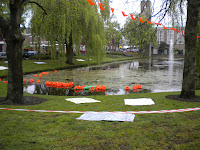 Throughout my time here I've met and spent some time working with the religious leaders here in my neighbourhood and the neighbourhood of Bergpolder. We became acquainted through their work in the community. On various afternoons and evenings, I've attended their church to participate in environmental awareness nights, cultural podiums, theatre productions, lectures concerning the fate or the future of the Hofplein line (the train line that runs through Bergpolder), author debates, bicycling tournament centres, spanish guitar performances, among other things.
Throughout my time here I've met and spent some time working with the religious leaders here in my neighbourhood and the neighbourhood of Bergpolder. We became acquainted through their work in the community. On various afternoons and evenings, I've attended their church to participate in environmental awareness nights, cultural podiums, theatre productions, lectures concerning the fate or the future of the Hofplein line (the train line that runs through Bergpolder), author debates, bicycling tournament centres, spanish guitar performances, among other things.Sorry, what did you say? No, you heard me correctly, these are events that took place at the two churches in my area...not a local community centre. But I find that these churches are just that, they are local community centres. These events are diverse but they still do not encompass the community work that is supported by these congregations or their pastors. For example, one of the pastors sits on the local Krachtwijk committee and the other spent many long months, with myself, on the 5th of Mei celebration organisation committee.
It may be my lack of participation in the religious community in Canada but I was frankly taken-aback to see how much a part of the community, these two churches and their adherents are. When I asked Berg (one of the pastors) why he was so active in the neighbourhood he simply said that "he was trying to be a good neighbour". He elaborated by saying that although religion was one of the reasons why he took part in the community, it was only one of the many reasons.
In general, the majority of literature about the role of religion in the Netherlands concludes that religion is no longer important in this seemingly secular society. But is this in fact the case? Does religion have to be within the doors of the church, and vice versa, that is do things that happen within the church have to be religious? The line of secular and religious becomes a bit more fuzzy when you see it in every day use.
 Interestingly enough, there is a debate going here in the Netherlands right now concerning the role of the church here in Dutch society. The debate is between a religion sociologist named Gerard Dekker and a historian named James Kennedy. Dekker argues that (my translation) "the core business of the church is dealing with God and His Word. If the Church interferes too much with social life, then there is a chance of major adjustment." Therefore Dekker is arguing that the church must keep a religious instead of social function in greater society.
Interestingly enough, there is a debate going here in the Netherlands right now concerning the role of the church here in Dutch society. The debate is between a religion sociologist named Gerard Dekker and a historian named James Kennedy. Dekker argues that (my translation) "the core business of the church is dealing with God and His Word. If the Church interferes too much with social life, then there is a chance of major adjustment." Therefore Dekker is arguing that the church must keep a religious instead of social function in greater society. Kennedy however is arguing exactly the opposite. He argues that the church can remain a contrasting community as Dekker wishes but that it needs to go out into the community in order to survive. "... the church also has a task for the outside world, which is reflected in the care for the homeless or residents of a nursing home (for example)". From what I understand, Kennedy would like the church to work within secular society as something that individuals can to look up to and not remain an aloof bystander as Dekker argues.
Dekker believes that potential extinction of the church as a religious institution (and not a social institution) is better than loosing its quality of religion. He worries that the church will take on too many negative connotations, such as the role of the church in Apeldoorn after the Queen's Drama and the location of the church in the Social Support Act. Would you like more info? Please click here.
 As I said above, seeing the work of those connected with the churches here in everyday life has brought these individuals (and the churches themselves as buildings in my perspective) into greater consciousness as I'm sure it does for those who live around and attend the events as I've done. Maybe I should make note of the fact that none of the events that I've attended so far have made me feel like they were fishing for converts. :) So, as far as I'm concerned, the churches here and their workers are doing their part to be a good neighbour to the surrounding community.
As I said above, seeing the work of those connected with the churches here in everyday life has brought these individuals (and the churches themselves as buildings in my perspective) into greater consciousness as I'm sure it does for those who live around and attend the events as I've done. Maybe I should make note of the fact that none of the events that I've attended so far have made me feel like they were fishing for converts. :) So, as far as I'm concerned, the churches here and their workers are doing their part to be a good neighbour to the surrounding community. What do you think?
No comments:
Post a Comment